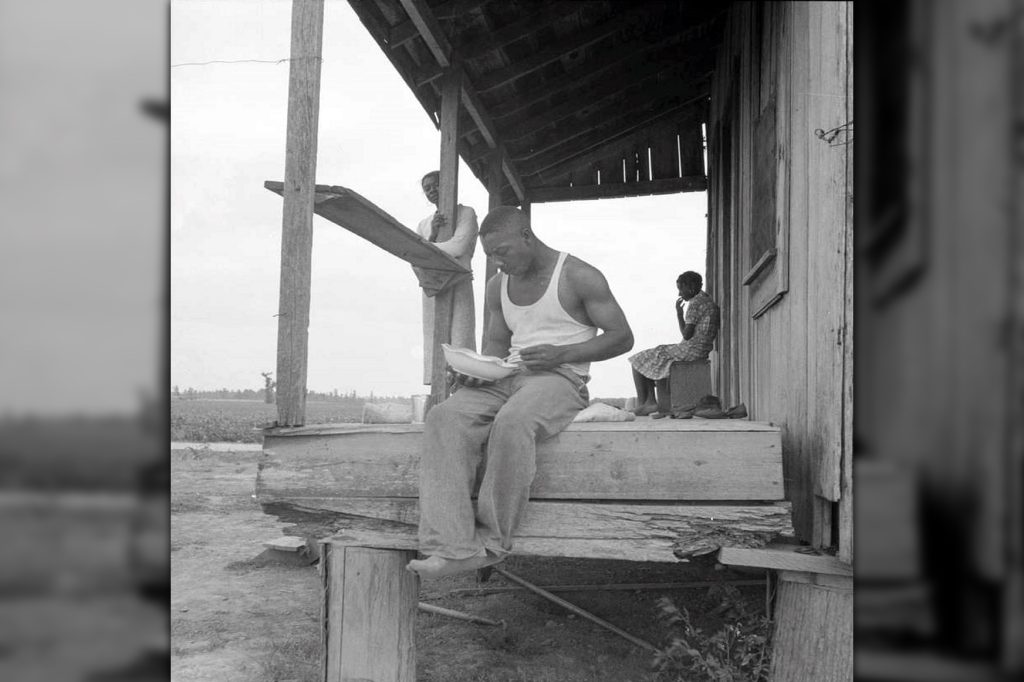Album Review: Terry Blade Schools Us On His ‘Ethos…’
By Richard Marcus

On his newly released album, Ethos: Son of a Sharecropper, Terry Blade finds the common ground between his cultural history and his personal truth. As he explains in his notes about the album, everything you need to know is spelled out in the title—’ethos’ can either refer to the moral values and beliefs of an individual or an entire culture.
With this set of songs, Blade is seeking to communicate the intersection of the ethos he’s developed as an openly queer African American and that of a descendent of sharecroppers. For those who don’t know, sharecropping was a feudal system of economic enslavement that allowed post Civil War landowners to keep their former slaves working their fields for no wages.
His decision to tell his stories through the vehicle of Americana music might come as a surprise to some, but just a reminder: there’s a long tradition of string bands among African Americans, and the banjo came over to North America from Africa via the slave trade. This is black music to the very core.
Listening to the ten tracks, you’ll hear elements of every type of roots music incorporated within. Blues, gospel, and country are all part of Blade’s experience, and they provide the glue that binds the sometimes disparate themes he expresses over the course of the album.
The song “Rainbow Child,” with its chorus of “Hey little Rainbow Child/I’ve never seen such a fella/rocking that pink and yellow,” sounds like Blade is looking at the new generation of queer folk reveling in their openness. The simple guitar and harmonica musical accompaniment, which recalls Harvest-era Neil Young, complements his powerful-but-mellow voice, give the tune depth and intensity that make this simple statement that much more penetrating. To these ears, “Rainbow Child” conjures up the image of an observer celebrating a new, younger, generation of queer people who have no hesitation of expressing their personal truth, well-suited to Blade’s ethos of being open about his sexuality. The rainbow flag is just as much a part of his cultural heritage as anything else.
It’s appropriate that Blade has used various strains of Americana to tell his stories because of his familial connection to sharecroppers. There’s nothing more ‘country’ than working the land, and while most people associate the old call-and-response field songs with gospel, they also gave rise to the country blues of folks like Charley Patton and Huddie “Lead Belly” Ledbetter.
There are elements of Blade’s album which are reminiscent of Lead Belly. Not so much regarding the sound, as the two men have very different voices and guitar styles, but in terms of the emotional and spiritual content—in the sense of being guided by something deeper than intellect. Blade taps into a cultural subtext and lets that become infused with his music.
From “Come Home” and “Won’t Be Around,” which deal with boundaries in personal relationships, to “Grandma’s House,” where we’re warned about how to behave when the women of the family are cooking, Blade covers a lot of territory. And yet, each tune has its own distinct resonance.
“Grandma’s House” exudes warmth through humor: “There’s grown-up conversation going on in the kitchen/The first time you heard grandma losing her religion/A whole lot of swearing/and a whole lot of living and a whole lot of laughing in the Black tradition/Ain’t no running in and out/ Not while mama is cooking/Ain’t no running in and out/Not while grandma is cooking.“
While amusing on the one hand, these images also underscore matriarchal roles in the black community. These strong black women not only ruled their domiciles but instilled pride and values in their children. In spite of the daily grind of racism and inequity, this song gives you the sense these women could take on the world… and did so on a regular basis.
With Ethos: Son of a Sharecropper, Blade joins Jake Blount, Rhiannon Giddens, and others who have stood up to remind of and reinforce the African American connection to Americana music. Blade blends elements of soul, R&B, gospel, blues and Americana to great effect, rendering a thoughtful and deeply emotional portrait of his history, both personal and cultural. A beautiful, uplifting album full of hope and love, ‘Ethos…‘ helps us to understand his story. You might cry a little listening, but you’ll feel better for it.
Richard Marcus has been writing about music, films, and books since 2005. He’s published three books commissioned by Ulysses Press. He currently edits the Books section at Blogcritics.org and is a regular contributor to Qantara.de. He lives in Kingston, Ontario Canada with his feral accomplice and their cat.